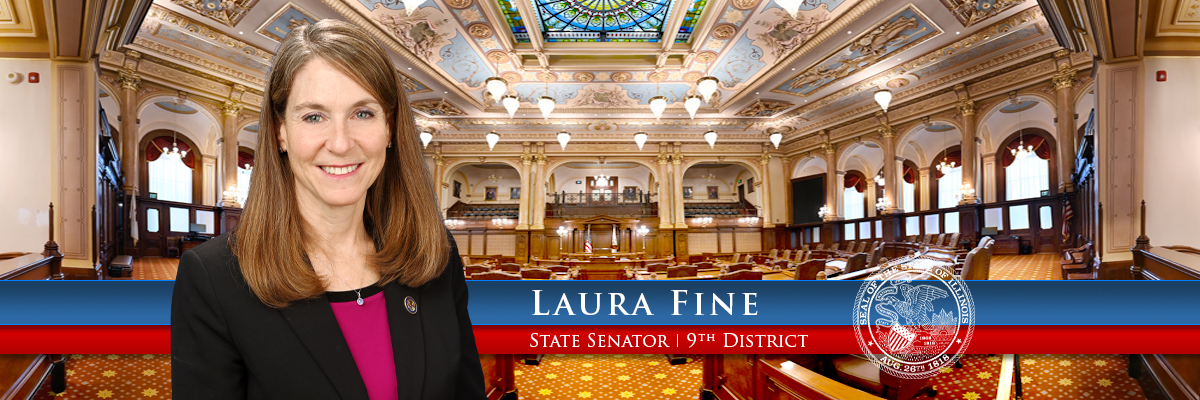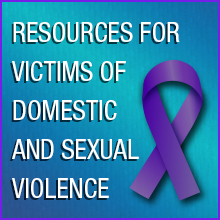- Details
- Category: Press Releases
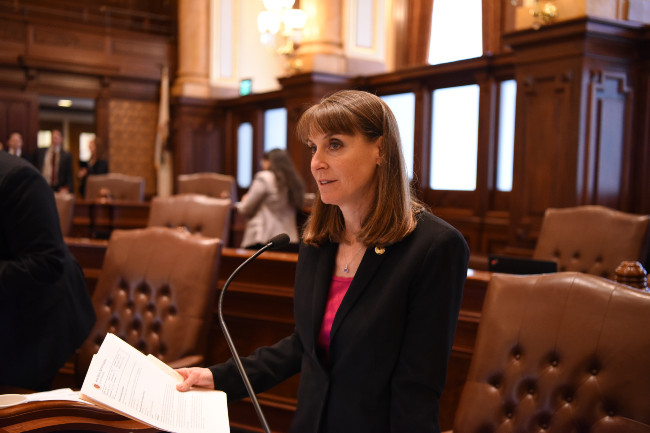 SPRINGFIELD – To restore the public’s trust in their elected officials in light of recent allegations of corruption within the Illinois government, State Senator Laura Fine (D-Glenview) joined her colleagues in the House and Senate to support a set of measures to overhaul ethics laws in Illinois.
SPRINGFIELD – To restore the public’s trust in their elected officials in light of recent allegations of corruption within the Illinois government, State Senator Laura Fine (D-Glenview) joined her colleagues in the House and Senate to support a set of measures to overhaul ethics laws in Illinois.
The legislative package includes nine proposals to increase transparency in all levels of state government. The lawmakers gathered Thursday to call on the Joint Commission on Ethics and Lobbying Reform to consider recommending the measures in their final report.
“Government officials should be working for their constituents, not themselves,” said Fine. “These steps have the potential to create long-term change to root out corruption and dishonesty in our state government.”
Among the measures Fine is encouraging the Joint Commission to consider:
- Establishing term limits on legislative leadership;
- Enacting a policy to temporarily remove a legislator as a leader and/or committee chair during a criminal investigation or in the event of a charge/indictment;
- Prohibiting legislators from lobbying elected officials from other units of government;
- Establishing at least a one-year prohibition on legislators leaving their offices and working as lobbyists;
- Expanding disclosure of legislators’ outside income; and
- Enabling the Legislative Inspector General to self-initiate investigations and making it an independent agency for the purposes of budgets and hiring.
“I hope all lawmakers—no matter their party—can agree these reforms are crucial to restoring Illinoisans’ confidence in government,” said Fine. “As elected officials, we need to stay vigilant and hold bad actors accountable to prevent corruption.”
The Joint Commission on Ethics and Lobbying Reform is expected to release a report in time for final action.
- Details
- Category: Press Releases

GLENVIEW – To address the widespread shortage of donated blood and potentially help treat patients with severe cases of COVID-19, State Senator Laura Fine (D-Glenview) is hosting a blood drive Thursday, Aug. 27 from noon to 6 p.m. at Glenview Village Hall, located at 2500 E. Lake Avenue.
“Since the pandemic began in March, blood donations have been critically low. With more researchers looking into plasma therapy as a potential COVID-19 treatment, we need more donations from people with antibodies,” said Fine. “Donating blood is always important, but right now it could help us fight this virus.”
All successful blood donations will be tested for COVID-19 antibodies. Researchers hope blood containing antibodies—also known as convalescent plasma—may help treat people with severe COVID-19 by boosting their ability to fight the virus.
The Centers for Disease Control and Prevention estimates about 17.2 million units of blood are used in transfusions every year for accident victims, cancer patients, hemophiliacs, surgery patients and more. In March, the CDC issued a statement encouraging healthy people to donate blood at blood centers that adhere to public health and safety guidelines.
Fine has partnered with Vitalant to host the event. To ensure the safety of all staff and donors, masks will be required.
Appointments are preferred, but walk-ins are welcome. To schedule an appointment to donate, call 877-258-4825 or visit www.Vitalant.org and use the group code 857A.
- Details
- Category: Press Releases
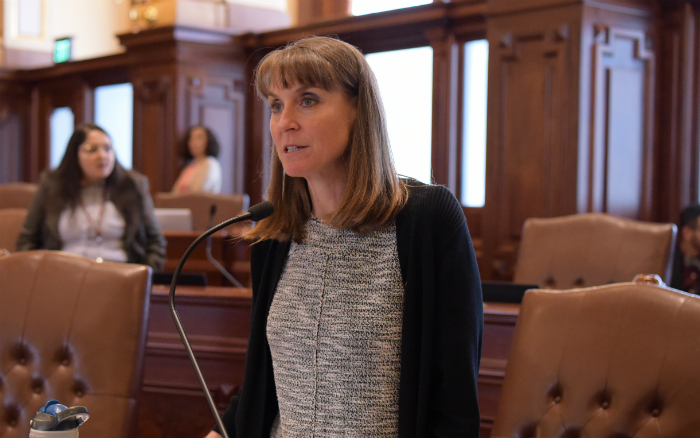 EVANSTON – To help at-risk youth develop important life skills and achieve long-term success, State Senator Laura Fine (D-Glenview) is proud to announce the Illinois Secretary of State has chosen the Evanston Public Library to administer the Project Next Generation program.
EVANSTON – To help at-risk youth develop important life skills and achieve long-term success, State Senator Laura Fine (D-Glenview) is proud to announce the Illinois Secretary of State has chosen the Evanston Public Library to administer the Project Next Generation program.
“This program invests in our youth and provides them with the tools they need to ensure a bright future,” said Fine. “These funds will provide opportunities critical to the success of our children, their families, our community and our state.”
The $39,899 grant was awarded through the Fiscal Year 2021 Project Next Generation program, which is a mentoring program administered through Illinois public libraries. Mentors work with middle and high school students to help them develop skills needed to use technology and find success through project-based learning. Mentors also help students develop life skills, such as effective communication, goal setting and conflict resolution.
The Evanston Public Library is one of 28 public libraries in the state to receive the grant.
In all, the secretary of state awarded more than $550,000 in Project Next Generation grants statewide. The money is provided by the Institute of Museum and Library Services. Grants are awarded to public libraries that serve culturally diverse, low-income and underserved populations.
“I am committed to improving the lives of at-risk youth in Illinois,” said White. “I established this innovative program when I first became secretary of state to give students an opportunity to receive hands-on experience with the latest technological tools at their local library.”
- Details
- Category: Press Releases
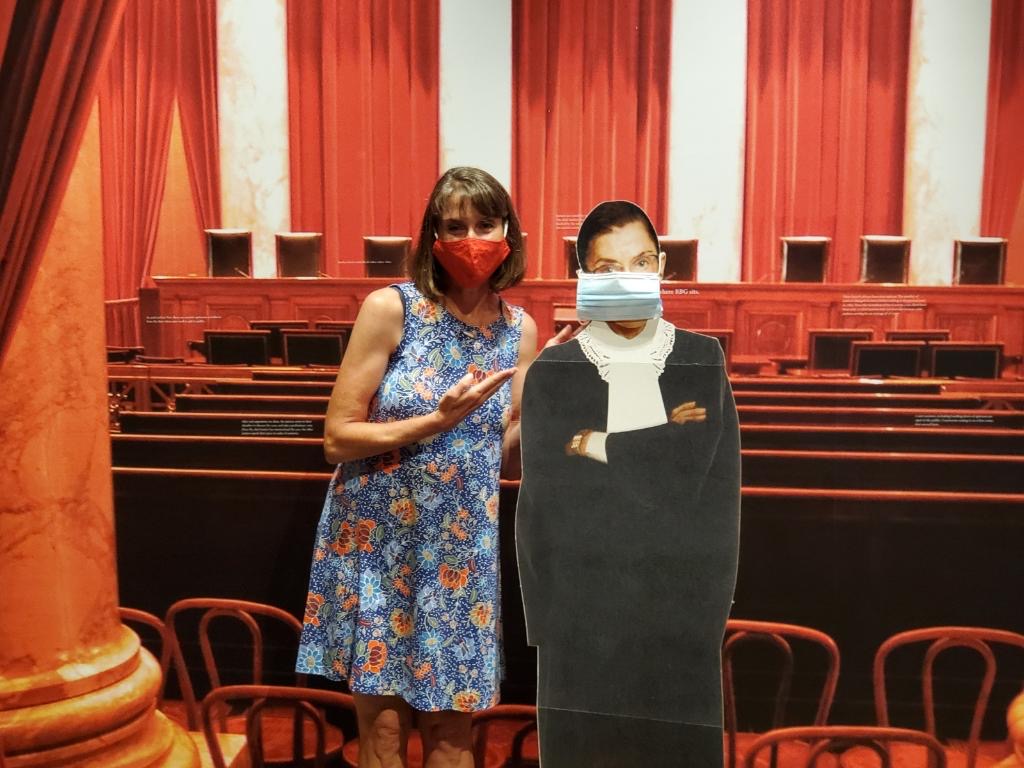
“The values of the Illinois Holocaust Museum—standing against hatred, prejudice and indifference, and moving toward a better future—are especially relevant during this time of unrest,” said Fine. “I was thrilled to be able view the exhibits and share in this experience with my fellow legislators, as well as show off one of the gems of the 9th District.”
The museum closed its doors in mid-March as a result of the COVID-19 pandemic. To ensure a safe reopening, the museum has introduced strict health and safety measures, including thorough cleaning procedures and temperature screenings for all visitors. Visitors must also wear face masks and purchase tickets online ahead of time.
The museum’s largest display is the Zev and Shifra Karkomi Holocaust Exhibition, which features more than 500 artifacts, documents and photographs from the era of the Holocaust. Visitors can also listen to Holocaust survivors tell their stories through interactive 3D holograms at the Take a Stand Center, named one of the top 12 exhibits in the world by Smithsonian Magazine in 2017.
Fine and State Senator Ann Gillespie (D-Arlington Heights) explored the museum’s current special exhibition, Notorious RBG: The Life and Times of Ruth Bader Ginsburg. The exhibition was set to run through Aug. 16, 2020, but has been extended through Jan. 3, 2021.
“The Illinois Holocaust Museum’s Ruth Bader Ginsburg exhibit celebrates her life’s work and commitment to upholding our nation’s values,” Gillespie said. “I was delighted to join the Senate and House Women’s Caucuses for a tour of the museum. With acts of anti-Semitism and white supremacy on the rise, the educational services the museum offers are more important than ever.”
To learn more about the museum, take advantage of virtual programs or reserve tickets, visit www.ILHolocaustMuseum.org.
More Articles …
- Senator Fine urges community organizations to apply for grant funding
- Fine invites residents to submit nominations to Senior Illinoisans Hall of Fame
- Senator Fine expands treatment options for sexual assault survivors during the pandemic
- Senator Fine: New budget acknowledges need for supportive government services during COVID-19 pandemic
Page 60 of 77
